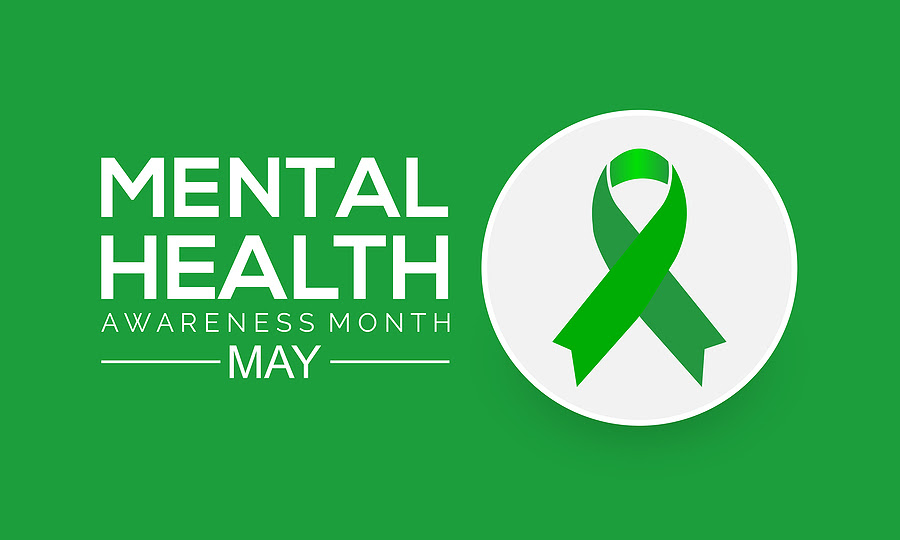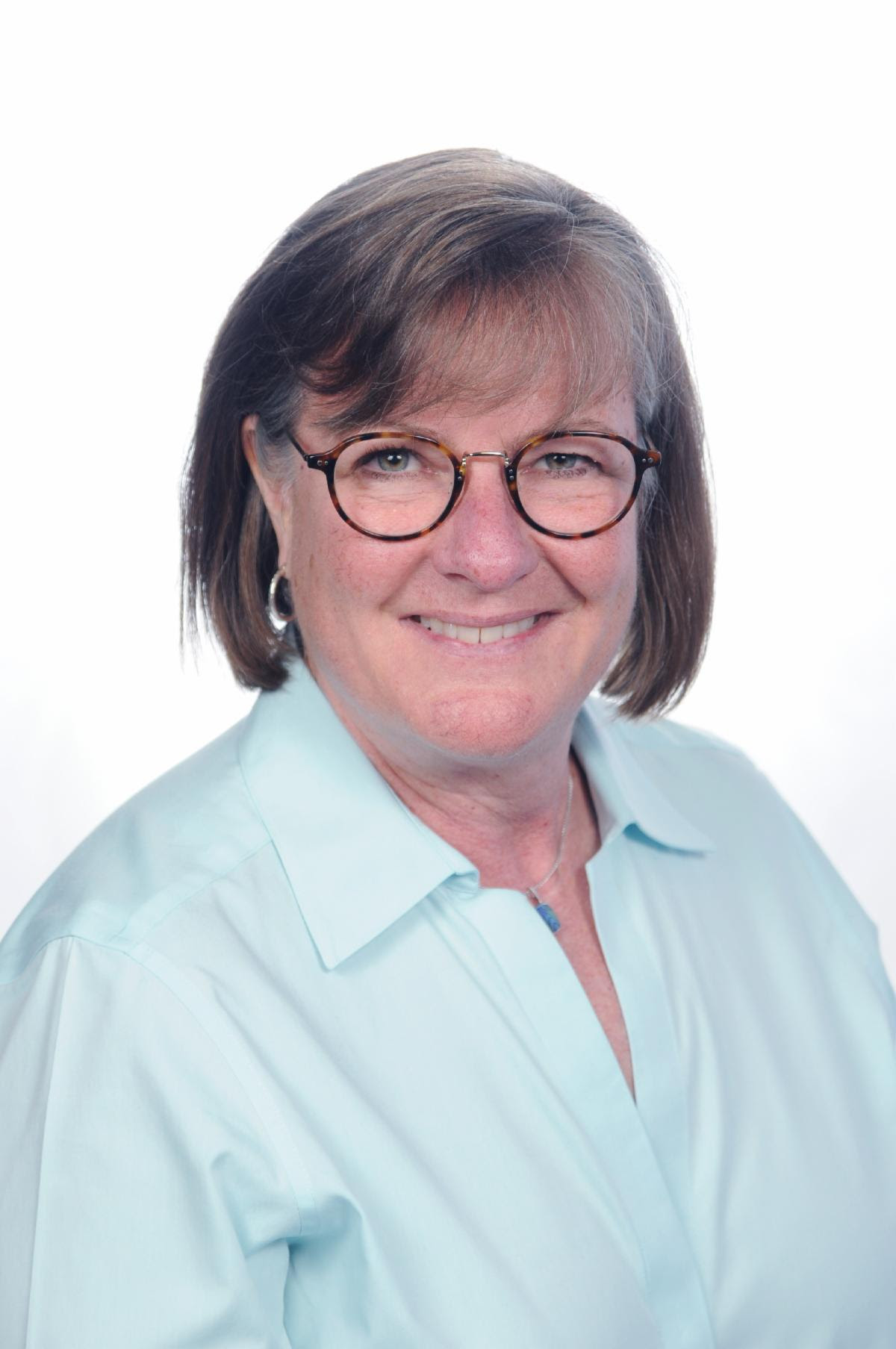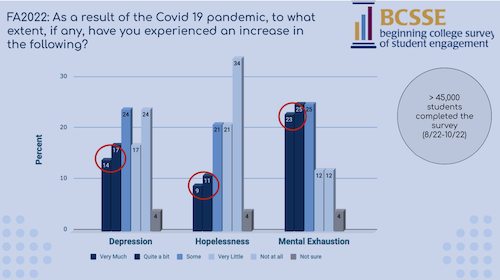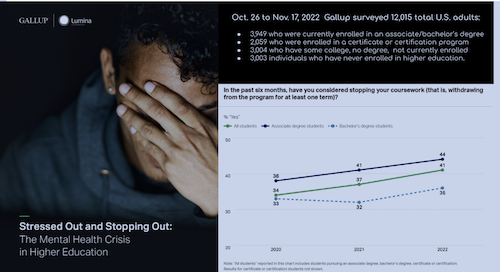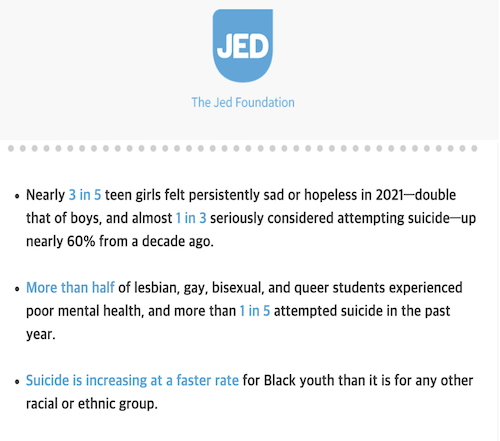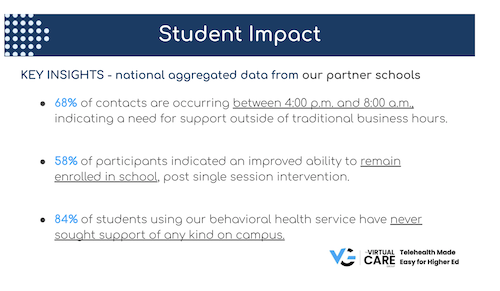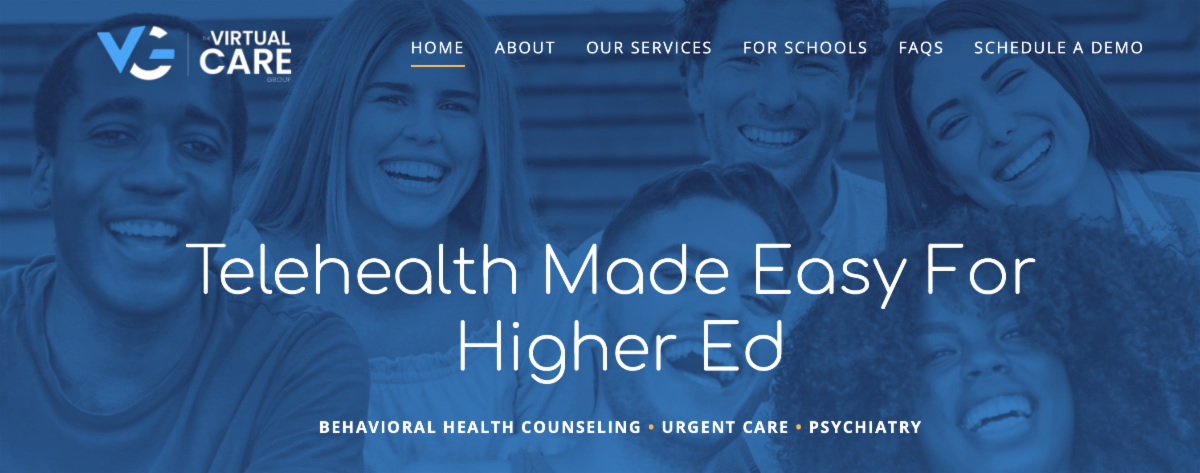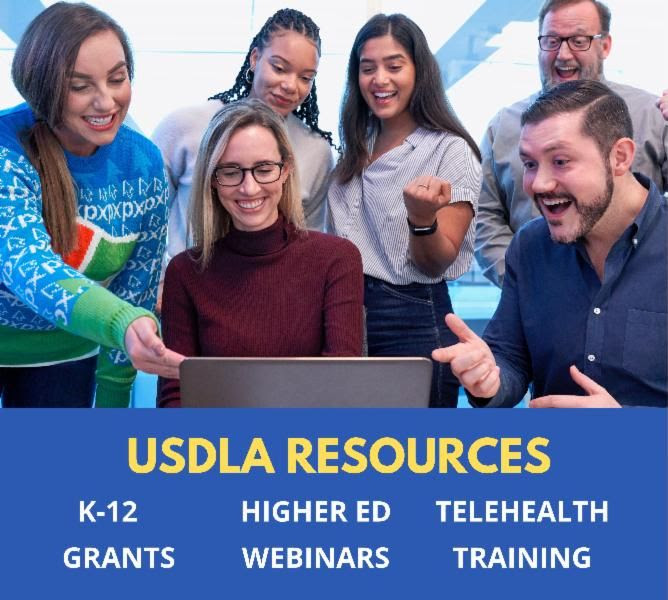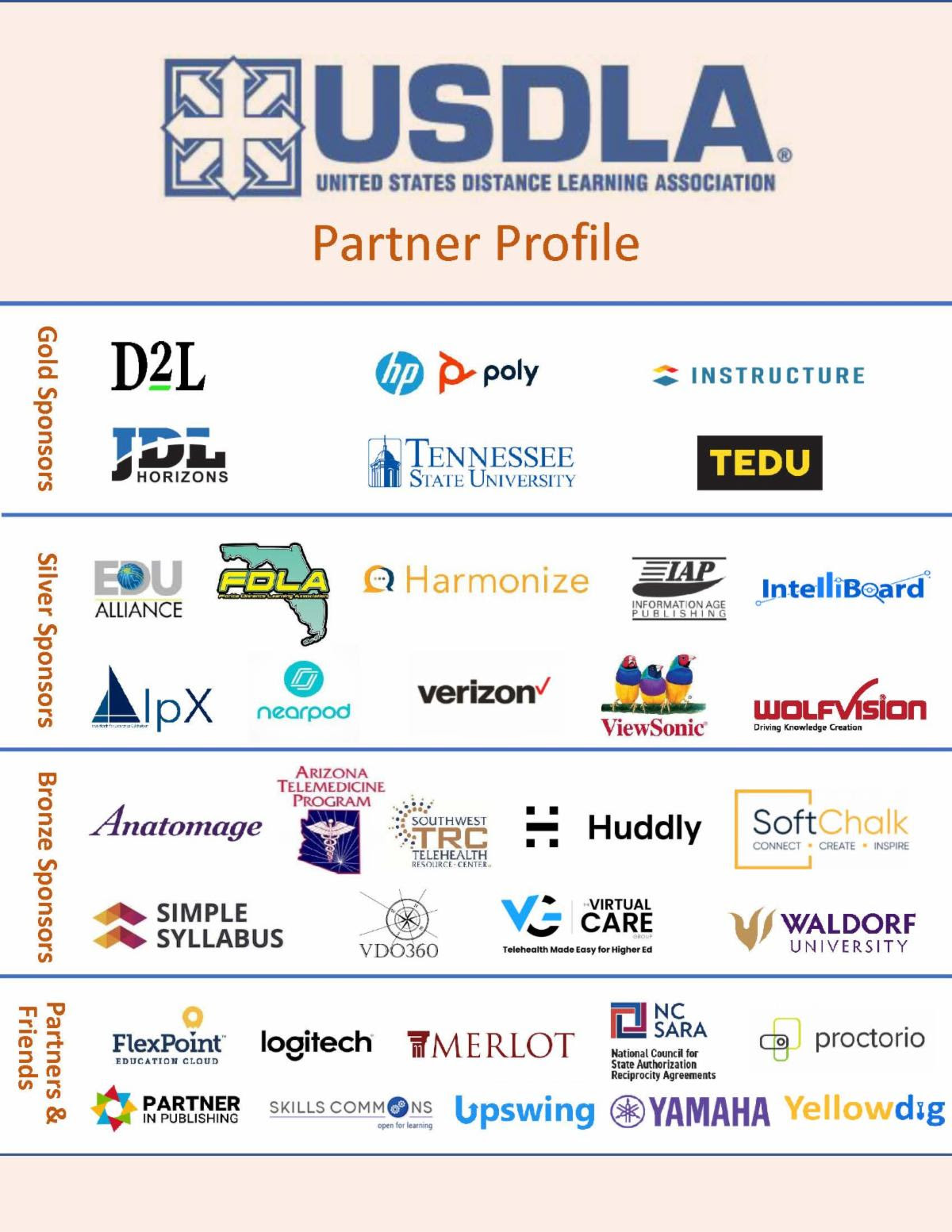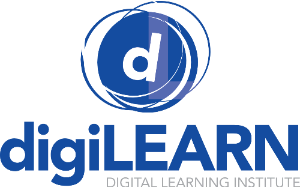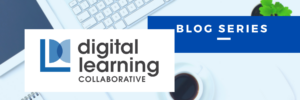|
Good morning, friends!
May is National Mental Health Awareness Month — a time to raise awareness of those living with mental or behavioral health issues and help reduce the stigma many experience.
Hospitals and health systems play an important role in providing behavioral health care and helping patients find resources available in their community, as do educational organizations.
“Started by the by the Mental Health America, Mental Health Awareness Month has been observed in May in the United States since 1949,” explains Emily Petitt, Vice President of Strategic Partnerships, The Virtual Care Group, who provided a Free Friday Webinar on May 12, entitled, “Partnering to Care for the Well-Being Needs of Your Campus Community.”
It was such a powerful presentation that we asked Emily to write an article on the topic. See that below. Click here to watch Emily’s webinar (free for 30 days). And click here to learn more about Mental Health Awareness Month.
Stay tuned for more: In our Thursday USDLA Brief, we’ll share more Free Friday Webinars and a handful of presenters you won’t want to miss at our National Conference July 17-20 in Orlando, FL. Sign up here: usdla.org/2023-national-conference/
In the meantime: More great webinars
- Wednesday, May 24, 1 pm Central: Please check out tomorrow’s webinar on Open Science with our sponsor EDEN NAP. Click here for details and to register.
- Wednesday, May 24 and Thursday, May 25: Logitech presents the “Unlocking the Power of Flexible Work.” Click here to register.
- Friday, May 26, 1 pm Eastern: USDLA Free Friday Webinar, “Sound of Conversation in 5 Steps with Pecha Kucha” with Kelli Erwin, Director of Education at Learning.com.
Wishing you all good mental health and well-being. — The USDLA Communications Committee
|
|
| A Note from Emily Petitt, Vice President of Strategic Partnerships, The Virtual Care Group |
|
|
I served on the Student Services front line for 25 years at 2yr, 4yr, public and private institutions, most recently as the Associate Vice President for Student Success and Title IX Coordinator.
In these roles, my greatest concern was always about the success of my students and the resulting retention and graduation rates.
The concern for the well-being of my students worried me the most and kept me up at night!
I know that for many students, their success is less about what happens in the classroom and more about life outside the classroom and the competing responsibilities they may have.
The top two reasons my students paused their education or “stopped out” were financial and mental/physical health.
As the AVP for Student Success, I partnered with The Virtual Care Group to address both issues by adding unlimited virtual urgent care, counseling, crisis counseling, and life coaching services. This gave me peace of mind in an uncertain world where my students were supported 24/7 with a sustainable well-being solution.
Caring for student well-being was such a passion for me. I joined The Virtual Care Group to serve as a solution partner to other “Emilys” across the nation. Thank you for the work you do every day to help your college students achieve their educational goals! Based on my webinar, I hope the following information will provide insight.
|
|
| Partnering to Care for the Well-Being Needs of Your Campus Community |
|
|
By Emily Petitt, Vice President of Strategic Partnerships, The Virtual Care Group
Addressing collegiate mental health needs has become critical for Higher Education professionals. According to recent studies, approximately one in four college students experiences a mental health disorder. Conditions such as anxiety, depression, and stress-related disorders are among the most common challenges students face. Factors contributing to these issues include academic pressures, social isolation, financial strain, the transition from adolescence to adulthood, and the lingering impacts of a global pandemic.
The Beginning College Survey of Student Engagement (above), conducted in the Fall semester of 2022, shows the distress level among entering college students from residual pandemic impacts. Shockingly, almost 50% of students surveyed reported mental/emotional exhaustion as they began their collegiate educational journey. Will they have the resilience to manage normal, expected college stressors if they are exhausted? The increase in student well-being places pressure on both fiscal and human resources as student-facing staff and faculty grapple with the complexities of complicated sustainable solutions.
|
|
|
As you can see from the graphic (right): Students experiencing mental health issues may find it challenging to concentrate, retain information, meet deadlines, and suffer from pervasive procrastination.
This can lead to declining grades, academic probation, and stop-outs which could become dropouts.
Gallup and Lumina surveyed cross-comparison of enrolled, not currently enrolled, and never enrolled adults across the US. With 41% of students polled having considered stopping coursework in the past six months, the need to support retaining students may be more urgent than ever.
|
|
|
Additional data from this survey show 69% of students noting emotional stress as a cause for stopping out.
Combined with the broadly anticipated decline in the number of students attending college over the next decade, are a call to action. Institutions must seek solutions to retain students.
A compounding factor in supporting student well-being is ensuring access and equity among an increasingly diverse student population. Traditional-age student populations expect individualized, on-demand, easily accessible access to services to support their educational journey.
|
|
|
These incoming students also represent the historically most diverse population of learners to attend higher education institutions, noted, for example, by increased numbers of BIPOC students, First Generation College Students, and students who identify as part of the LGBTQ community. The onus is on the institution to provide equally diverse and accessible support services for its student population.
|
|
|
The Jed Foundation is a nonprofit organization that protects emotional health and prevents suicide for teens and young adults nationwide.
The graphic, right, summarizes the latest CDC data from the Youth Risk Behavior Survey, and the data are alarming.
In aggregate data among our nationwide campus partners, we have been able to help colleges care for their students. Students using The Virtual Care Group Services most frequently contact us on evenings and weekends, and 54% report an improved ability to remain enrolled in school after ONE session!
|
|
|
Additionally, our telehealth services reach students who are not otherwise being served by institution services, as 84% report they have not sought services on campus.
As campuses grapple with establishing a comprehensive care model, telehealth partnerships are increasingly a part of sustainability planning.
Collegiate mental health needs should be recognized as a critical priority within higher education. Partnerships, both internally and externally, are essential to meet this demand.
Internal partnerships showcase a campus-wide responsibility and care for the student. External partnerships can leverage expertise, and accessibility (24/7, diverse practitioners) and offer affordable, customizable options versus simply adding staff to the payroll.
By investing in mental health services, creating a supportive campus environment, and fostering collaboration, educational institutions can empower students to navigate the challenges of college life while maintaining their mental well-being.
With concerted efforts and a holistic approach, colleges can play a transformative role in shaping a generation of mentally resilient and successful individuals while retaining their community of learners.
|
|
|
If you missed it: Check out Emily’s webinar here: usdla-org/zoom
Topic: Partnering to Care for the Well-Being Needs of Your Campus Community
Presenter: Emily Pettit, Vice President of Strategic Partnerships, The Virtual Care Group
Session: Almost 50% of 2022 entering college students report being “Mentally Exhausted” (BCSSE, 2022) as they begin college. With the increase in student need running head first into the employee Great Resignation/Quiet Quitting, sustainable solutions are complicated. This session will highlight the national data on campus wellness, review a telehealth partnership case study and share some resources for caring for your campus community.
About Emily: I have served on the Student Services frontline for 25 years at 2-the and 4-year institutions, most recently as the Associate Vice President for Student Success and Title IX Coordinator at a university in Georgia. Using my degrees in Psychology and Counseling, I have enjoyed developing and implementing initiatives supporting student success – carefully attending to wellness and retention concerns. As the Vice President of Strategic Partnerships at the Virtual Care Group, I shift my care and concern for students from the micro level (on campus) to the macro level (supporting colleges nationally) to focus on the well-being of ALL college students.
Click here to learn more about Virtual Care: Telehealth for Higher Ed.
|
|
| Thank You to Our National Sponsors
D2L, Instructure, JDL Horizons, Poly, TSU, TEDU, Verizon, Edu Alliance Group, Harmonize, FDLA, IAP, IPX, Nearpod, ViewSonic, Wolfvision, Yellowdig, Anatomage, Arizona Telemedicine Program and Southwest Telehealth Resource Center, Huddly, Softchalk, NC Sara, Proctorio, Simple Syllabus, VDO360, VirtualCare, Waldorf University, XanEdu, Merlot, IntelliBoard, FlexPoint, Logitech, Skills Commons, BocaVox, PIP, Upswing, Yahama Unified Communications,
|
|
| Thank you for supporting USDLA, our Sponsors, and our State Chapters.
Eric Jones, President
Chuck Sengstock, President-elect
About United States Distance Learning Association (USDLA)
The USDLA, a 501(c) 3 non-profit association formed in 1987, reaches 20,000 people globally with sponsors and members operating in and influencing 46% of the $913 billion. U.S. education and training market. USDLA promotes the development and application of distance learning for education and training and serves the needs of the distance learning community by providing advocacy, information, networking, and opportunity. Distance learning and training constituencies served include pre-K-12 education, home schooling, higher education, and continuing education, as well as business, corporate, military, government, and telehealth markets. Visit USDLA.org
|
|
|
|
|




